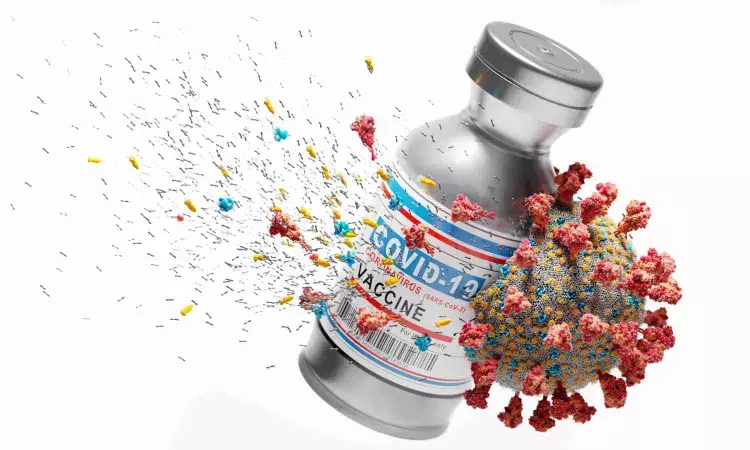- Home
- Medical news & Guidelines
- Anesthesiology
- Cardiology and CTVS
- Critical Care
- Dentistry
- Dermatology
- Diabetes and Endocrinology
- ENT
- Gastroenterology
- Medicine
- Nephrology
- Neurology
- Obstretics-Gynaecology
- Oncology
- Ophthalmology
- Orthopaedics
- Pediatrics-Neonatology
- Psychiatry
- Pulmonology
- Radiology
- Surgery
- Urology
- Laboratory Medicine
- Diet
- Nursing
- Paramedical
- Physiotherapy
- Health news
- Fact Check
- Bone Health Fact Check
- Brain Health Fact Check
- Cancer Related Fact Check
- Child Care Fact Check
- Dental and oral health fact check
- Diabetes and metabolic health fact check
- Diet and Nutrition Fact Check
- Eye and ENT Care Fact Check
- Fitness fact check
- Gut health fact check
- Heart health fact check
- Kidney health fact check
- Medical education fact check
- Men's health fact check
- Respiratory fact check
- Skin and hair care fact check
- Vaccine and Immunization fact check
- Women's health fact check
- AYUSH
- State News
- Andaman and Nicobar Islands
- Andhra Pradesh
- Arunachal Pradesh
- Assam
- Bihar
- Chandigarh
- Chattisgarh
- Dadra and Nagar Haveli
- Daman and Diu
- Delhi
- Goa
- Gujarat
- Haryana
- Himachal Pradesh
- Jammu & Kashmir
- Jharkhand
- Karnataka
- Kerala
- Ladakh
- Lakshadweep
- Madhya Pradesh
- Maharashtra
- Manipur
- Meghalaya
- Mizoram
- Nagaland
- Odisha
- Puducherry
- Punjab
- Rajasthan
- Sikkim
- Tamil Nadu
- Telangana
- Tripura
- Uttar Pradesh
- Uttrakhand
- West Bengal
- Medical Education
- Industry
Effect of Maternal COVID-19 Vaccination Timing in Preterm Infants and their antibody levels: JAMA

The effects of COVID-19 vaccine pre and post pregnancies are little known and are being evaluated to known its effects on the mother as well as foetus since the pandemic. The safety and efficacy of vaccination timings becomes very crucial for both their safety.
COVID-19 vaccine–derived antibodies in pregnant people may protect infants from severe infection in the first 6 months of life via transplacental antibody transfer. Few data exist on maternally derived SARS-CoV-2 antibodies in preterm compared with full-term infants in association with vaccination timing.
To compare SARS-CoV-2 anti-Spike (anti-S) antibody levels in preterm and full-term infants in the context of vaccine dose timing before delivery researchers conducted a prospecrtive study. The study in JAMA Network says that maternal anti-Spike antibody concentration is a key factor in determining preterm and full-term infant maternally derived anti-Spike concentrations.
Researchers in the prospective cohort study enrolled pregnant individuals and collected paired maternal and cord blood samples at delivery at the University of Washington between February 1, 2021, and January 31, 2023. Participants who had received at least 2 doses of a messenger RNA COVID-19 vaccine before delivery and did not have a history of prior COVID-19 infection or detectable anti–SARS-CoV-2 nucleocapsid antibodies were included. Timing of the last vaccine dose and preterm or full-term gestational age at delivery.
Paired maternal and cord samples were tested for anti-S antibody, and linear regression was used to evaluate associations between preterm delivery and anti-S antibody levels. Covariates included timing of last dose, number of doses, insurance status, and immunosuppressing medications.
The key findings of the study are
- A total of 220 participants (median [IQR] age, 34 [32-37] years; 212 [96.4%] female) with 36 preterm and 184 full-term deliveries were studied. Before delivery, 121 persons received 2 vaccine doses and 99 persons received 3 or more vaccine doses.
- The geometric mean concentration of maternal anti-S antibodies was 674 (95% CI, 577-787) after 2 doses and 8159 (95% CI, 6636-10 032) after 3 or more doses (P < .001). The cord anti-S antibody geometric mean concentration was 1000 (95% CI, 874-1144) after 2 doses and 9992 (95% CI, 8381-11 914) after 3 or more doses (P < .001).
- After adjustment for vaccine timing and number of doses before delivery, no association was found between preterm delivery and cord anti-S antibody levels (β = 0.44; 95% CI, −0.06 to 0.94).
Researchers concluded that "In this prospective cohort study of pregnant individuals with preterm and full-term deliveries, receipt of 3 or more compared with 2 doses of COVID-19 vaccine before delivery resulted in 10-fold higher cord anti-S antibody levels. Maternal antibody concentration appeared more important than delivery gestational age in determining cord anti-S antibody levels. The number of doses and timing considerations for COVID-19 vaccine in pregnancy should include individuals at risk for preterm delivery."
Reference:
Kachikis A, Pike M, Eckert LO, et al. Timing of Maternal COVID-19 Vaccine and Antibody Concentrations in Infants Born Preterm. JAMA Netw Open. 2024;7(1):e2352387. doi:10.1001/jamanetworkopen.2023.52387
MSc. Neuroscience
Niveditha Subramani a MSc. Neuroscience (Faculty of Medicine) graduate from University of Madras, Chennai. Ambitious in Neuro research having worked in motor diseases and neuron apoptosis is interested in more of new upcoming research and their advancement in field of medicine. She has an engrossed skill towards writing and her roles at Medical dialogue include Sr. Content writer. Her news covers new discoveries and updates in field of medicine. She can be reached at editorial@medicaldialogues.in
Dr Kamal Kant Kohli-MBBS, DTCD- a chest specialist with more than 30 years of practice and a flair for writing clinical articles, Dr Kamal Kant Kohli joined Medical Dialogues as a Chief Editor of Medical News. Besides writing articles, as an editor, he proofreads and verifies all the medical content published on Medical Dialogues including those coming from journals, studies,medical conferences,guidelines etc. Email: drkohli@medicaldialogues.in. Contact no. 011-43720751


